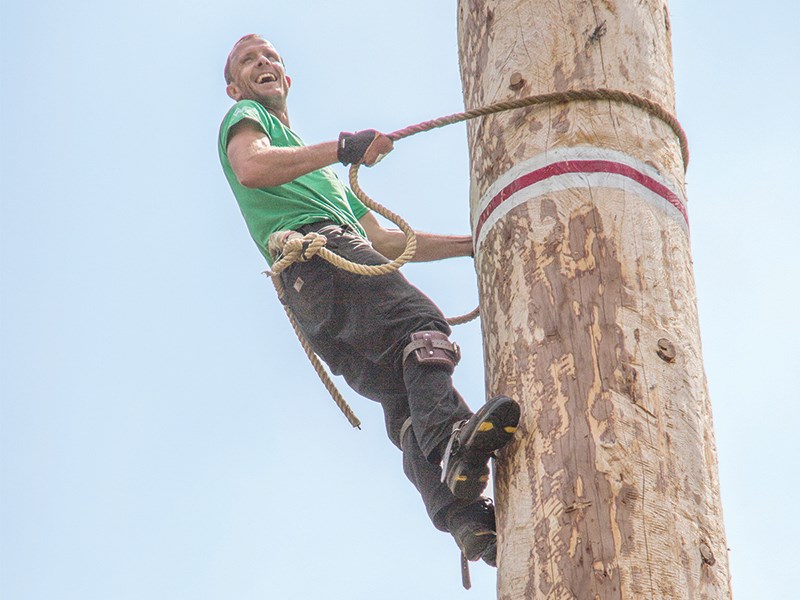Everything about Powell River sports, even Powell River Kings hockey club, normally the number one game in town, was overshadowed in 2016 by the triumphant return of Powell River Logger Sports.
After an absence of 11 years, Powell River was buzzing as loudly as the roar of the chainsaws that ripped through the newly named Loggers Memorial Bowl at Willingdon Beach. Taking place from Friday, July 15, to Sunday, July 17, logger sports drew lumberjacks from around BC, across Canada and the United States, and as far away as New Zealand.
Logs were cut, axes were thrown, poles were climbed and champions were crowned, thrilling throngs of people who packed the beach all weekend. When all was said and done, the event drew huge crowds. Organizers estimated approximately 20,000 people attended over the three days.
On the official rule sheet for Powell River Logger Sports, rule number 11 stipulated, “Absolutely no whining. Everyone must have fun!” By all accounts, everyone did.
Some of the best loggers in the world competed for Canadian and world championships and a prize purse totalling $60,000. Event winners from Powell River included Braiden Coburn, Julian Welp, Brett Marquis, Jeff Coburn and Allan Knapp.
Before the loggers arrived, Powell River’s tent city went up at Willingdon Beach for the annual arrival of 600 spandex-clad mountain bikers competing in the 10th BC Bike Race. Stage two took place on July 8 and marked the seventh occasion race organizers included a stop in Powell River, which has been ranked as the racers’ second favourite leg of the gruelling endurance event for the last couple of years. Riders cite the trails and their favourite location, the setting at Willingdon Beach, as reasons for the stage’s popularity.
Trails in the Duck Lake protected area, where the race is routed through, rank just behind Squamish as tops for racers, according to race organizers. Four Powell River cyclists competed in the seven-stage race: Brad and Patricia Winchell, Russell Brewer and Colin Koszman.
Powell River Kings began 2016 in the midst of a four-game winning streak but were unable to sustain that momentum into the BC Hockey League post-season. After the Kings defeated Cowichan Valley in six games, Nanaimo ousted Powell River in the second round to advance. Kings battled Victoria Grizzlies for top spot in Island Division standings for most of the 2016-2017 pre-Christmas portion of their regular season schedule, but lost their last four games heading into the break.
Vancouver Island Soccer League’s Powell River Villa soccer club ended 2016 just as it began the year, struggling for goals and wins. Due to its seventh place finish in last season’s standings, Villa did not see any playoff action in 2016. Mario Paul took over as the club’s new head coach with a goal of taking Villa from the second division to the first.
“You have to go for it right off the bat, you don’t come to lose,” said Paul.
However, that is exactly what Villa is doing: losing. Unless the team can improve on its current eighth place position in the standings heading into the second half of the 2016-2017 season, playoffs will be out of reach once again, which begs the question, how many different ways can a “Villa loses again” headline be written?
A new climbing wall was built by Powell River Climbing Co-op in what is eventually supposed to be The Warehouse in Townsite. While the wall is complete, The Warehouse is not. With no firm opening date and no revenue coming in for the co-op, how long can the wall last before the idea comes tumbling down? Was the $160,000-grant from Powell River Community Forest well spent?
Individual athlete Tristen Chernove captured local and national attention throughout 2016. Born and raised in Powell River, Chernove burst onto the international para-cycling scene with world championships and world cup wins and, ultimately, gold, silver and bronze medals at the second largest sporting event in the world: the Rio 2016 Paralympic Games. It was a remarkable accomplishment by an inspiring individual.
Chernove took up the sport to offset the ravaging effects of Charcot-Marie-Tooth (CMT) disease, which he was diagnosed with in 2009. A rare hereditary disorder that affects the nervous system, CMT produces symptoms similar to muscular dystrophy.
One of Chernove’s favourite memories of growing up in Powell River, he said, were of days taken off from school to go fishing with his dad, when connecting with nature and each other was needed more than another day in the classroom.
“Being from Powell River has everything to do with who and how I am in the world,” he said. “But it’s not due to the physical geography of the place but the people in that place who were part of forming me. I am a reflection of the friends I grew up with and my family, who happen to be some of the best people and brightest spirits on earth.”



